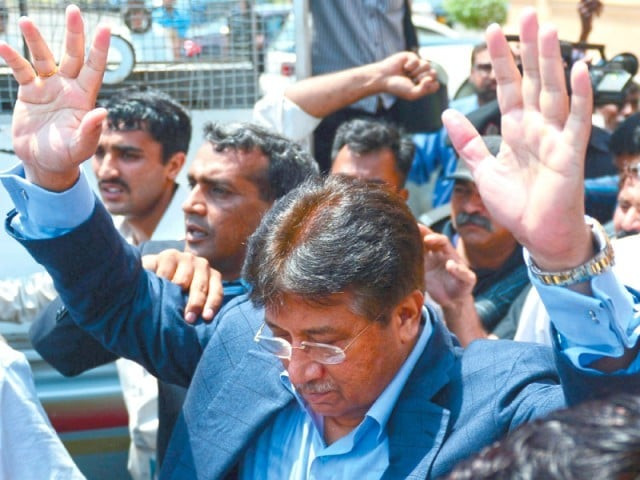I’m not here to pass a judgement on Musharraf. My issue is with the principle at hand. If Musharraf has been tried for treason then there is an extensive list of politicians that also deserve some, if not more, attention. I am a firm believer in democracy and justice but not in the selective hypocritical versions we want to see in Pakistan where we fool ourselves into letting our individual views become reflective of the masses at large.
Musharraf hasn’t committed any atrocity that the rest of our leaders have not partaken in. Trying and punishing Musharraf will have little effect on matters of the state or lives of ordinary Pakistani citizens- at most it will be a meagre attempt at a symbolic lash out against the army. But then, I guess that’s what our leaders specialise in- ineffectual action that satisfy little else other than their own whims.
Paradoxically, a leader comes from the people themselves. Is it a reflection of us as a nation, then, that our leaders continue to be hypocritical and weak in their words and actions? Why do we elect the same old politicians and listen to the beaten, useless rhetoric that they spew? Do we really believe in innovative political ideologies and progress? Because it seems to me that nowadays we simply associate votes with faces. I am tempted to say that the recent election turned out to be a case of voting by mere association instead of a result of healthy political analysis of the problems and solutions before us.
If our political leaders indulge in documented, illegal activities, why don’t we examine the root causes of why they are able to get away with everything instead of whining hopelessly about the past?
Perhaps we can move away from vendettas against leaders of the past to confront the problems plaguing us today, right now, at this very moment. For instance, why don’t we acknowledge the persecutions faced by the different minority groups openly? What tangible, effective measures have been taken or even promised by our leaders to safeguard the rights of these groups who are slowly being deprived of their homes?
Then there is the deteriorating province of Balochistan, and the rising insurgencies within KPK. Our authorities aren’t even half as agile in prosecuting those spewing violence and terror in those parts of the country, where citizens have been demanding a better life for decades.
If it is the past we are concerned with the most, how come the history books taught in our schools make little mention of the separatist movement that has been raging in Balochistan, or historic realities such as the initial reluctance of the then NWFP to join Pakistan?
Issues destabilising our country today are reactionary. Yes, we must delve in the past to ensure we break out of this vicious cycle. But let’s not confine our political ambitions to revenge and past offenders of the law. There is the present to deal with.
I cannot emphasise how lucky we have been to make it to today- you can attribute this survival to whatever your heart believes in; God, the willpower of the masses or the many unsung heroes of our soil. We stand at an important juncture now as a nation and we have to keep our leaders accountable. Thankfully, social media has provided us with an unprecedented advantage- asking questions and creating dialogues has never been easier.
As Faiz wrote,
‘Nijat e dida oh dil ki ghari aayi nahi,
Chalay chalo keh who manzil abhi aayi nahi’
(Heart and eyes- their freedom have not yet been obtained,
Let us go on, for the destination has not yet been attained.)
We need an educated rebellion, not a revolution - revolutions only add to the instability and I fear we have had too much of that already.
Read more by Nabeel here.



COMMENTS
Comments are moderated and generally will be posted if they are on-topic and not abusive.
For more information, please see our Comments FAQ